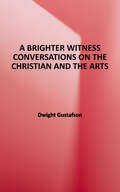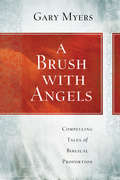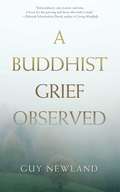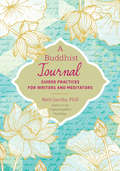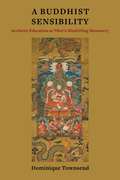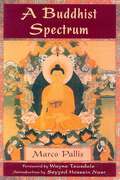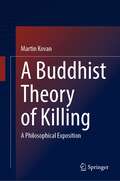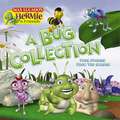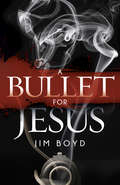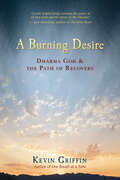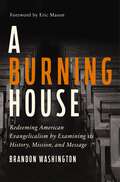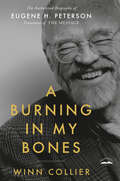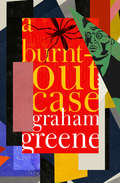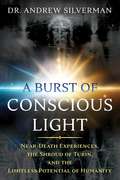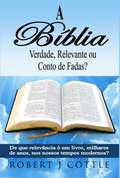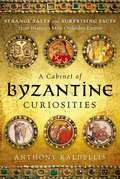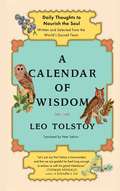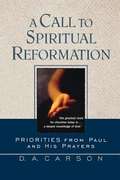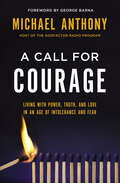- Table View
- List View
A Brighter Witness: Conversations on the Christian and the Arts
by Dwight Gustafson"Essays on the Christian and the Arts"--Provided by publisher.
A Broken Kind of Beautiful
by Katie GanshertSometimes everything you ever learned about yourself is wrong Fashion is a fickle industry, a frightening fact for twenty-four year old model Ivy Clark. Ten years in and she's learned a sacred truth--appearance is everything. Nobody cares about her broken past as long as she looks beautiful for the camera. This is the only life Ivy knows--so when it starts to unravel, she'll do anything to hold on. Even if that means moving to the quaint island town of Greenbrier, South Carolina, to be the new face of her stepmother's bridal wear line--an irony too rich for words, since Ivy is far from the pure bride in white. If only her tenuous future didn't rest in the hands of Davis Knight, her mysterious new photographer. Not only did he walk away from the kind of success Ivy longs for to work maintenance at a local church, he treats her differently than any man ever has. Somehow, Davis sees through the façade she works so hard to maintain. He, along with a cast of other characters, challenges everything Ivy has come to believe about beauty and worth. Is it possible that God sees her--a woman stained and broken by the world--yet wants her still?
A Brother Beloved
by Francena ArnoldJoyce Matthews raised her beloved younger brother, Gene, after the death of both their parents. Much to Joyce&’s dismay, however, a year in military service behind the iron curtain seems to have completely changed his personality. This haunting drama includes Joyce&’s cry for help and God&’s faithful answer.
A Brother Beloved
by Francena ArnoldJoyce Matthews raised her beloved younger brother, Gene, after the death of both their parents. Much to Joyce&’s dismay, however, a year in military service behind the iron curtain seems to have completely changed his personality. This haunting drama includes Joyce&’s cry for help and God&’s faithful answer.
A Brother's Promise (Bliss, Texas #2)
by Mindy ObenhausA little girl will change his world…He didn’t realize he wanted a family…until he suddenly became a single dad.After his sister’s death, rancher Mick Ashford’s determined to ensure his orphaned niece, Sadie, feels at home. And accepting guidance from Christa Slocum is his first step. But just as Christa and Sadie start to settle into Mick’s heart, Sadie’s paternal grandparents sue for custody. Now Mick must fight to keep them together…or risk losing the makeshift family he’s come to love.From Harlequin Love Inspired: Uplifting stories of faith, forgiveness and hope.Bliss, TexasBook 1: A Father’s PromiseBook 2: A Brother’s Promise
A Brush with Angels: Compelling Tales of Biblical Proportion
by Gary MyersIn this collection of powerful narratives and personal messages by best-selling author Gary Myers you will discover fresh encouragement to face whatever is ahead, inspiration to believe in the amazing, and a renewed devotion to live life to the fullest.<P><P> When was the last time you read story that had a compelling effect on its readers? When was the last time you read stories that gave a sense of assurance that people are deeply loved and that inspired you to change your world? Stories should bring refreshment and renewal to the soul. Welcome to a collection of powerful narratives that will encourage, inspire, and change readers, bringing a surprising assurance to their souls.<P> Readers will hear a story about a woman who found a new lease on life based on a touch by a stranger, a man who was completely forgiven after a horrible night of betrayal, and about a person who knew he was protected from evil by an angel. These stories provide a new assurance that people are not alone in this world and that there is a reason to hope against all hope. This book helps people find new purpose and meaning in a world that has become stale, stagnant, and cynical.
A Brush with Love: A January Wedding Story (A Year of Weddings Novella)
by Rachel HauckGinger Winters is a gifted hairstylist with scars no one can see. The last thing she expects from the New Year is a new chance at love. Overcoming a childhood tragedy, Ginger emerges from the pain and trauma with a gift for bringing out the beauty in others. From the top big city salons to traveling the world as personal stylist to a country music sensation, success was almost enough to make Ginger forget she would never be one of the beautiful people. that girl, forever on the outside looking in. But she needs her confidence this weekend. She’s the acclaimed “beauty-maker” for the Alabama society wedding of the decade. When high-school crush Tom Wells Jr. also returns to town and shows up at her shop looking for a haircut, Ginger’s thinly veiled insecurities threaten to keep her locked away from love, Despite Tom’s best efforts, Ginger can’t forget how he disappeared on her twelve years ago and broke her heart. Can she ever trust him again? When Tom challenges her to see her own beauty, Ginger must decide if she will remained chained to the past or move freely into a new, exciting future.
A Buddhist Grief Observed
by Guy NewlandAmid the world-shattering pain of loss, what helps?"After the death of his beloved partner from cancer, Newland finds himself asking how effective his long years of Buddhist practice have been in helping him come to terms with overwhelming grief. This finely written book offers a lucid meditation on what it means to practice the Dharma when everything falls apart." --Stephen Batchelor, author of Buddhism without Beliefs and After Buddhism In the tradition of C. S. Lewis's A Grief Observed, Guy Newland offers this brave record of falling to pieces and then learning to make sense of his pain and grief within his spiritual tradition. Drawing inspiration from all corners of the Buddhist world--from Dogen and the Dalai Lama, to Pema Chödrön and ancient Pali texts--this book reverberates with honesty, kindness, and deep humanity. Newland shows us the power of responding fully and authentically to the death of a loved one. "A sad, beautiful, and necessary book--and a map waiting for many who will need it." --James Ishmael Ford, author of If You're Lucky Your Heart Will Break "Guy Newland faces squarely the pain of death and the pain of grief and offers a work of uncommon power, insight, and honesty--and extraordinary compassion." --Jay L. Garfield, author of Engaging Buddhism
A Buddhist Journal: Guided Practices for Writers and Meditators
by Beth JacobsA guided journal that uniquely combines personal writing and meditation—two of the most beneficial self-help processes availableIn this book, Beth Jacobs—who has taught and written extensively on both Buddhist psychology and therapeutic writing—provides a variety of writing techniques and exercises that are matched with specific Buddhist meditation instructions and teachings. She describes meditation practices and Buddhist concepts along with writing exercises that bring the material to life. Writers will find exercises that deepen their experiences in general and writing in particular. Meditators will find Buddhist concepts clarified and techniques expanded. All readers will discover a laboratory of writing as experimentation, with structures that open ideas, break habits, and combine experience in novel ways.
A Buddhist Sensibility: Aesthetic Education at Tibet's Mindröling Monastery (Studies of the Weatherhead East Asian Institute, Columbia University)
by Dominique TownsendFounded in 1676 during a cosmopolitan early modern period, Mindröling monastery became a key site for Buddhist education and a Tibetan civilizational center. Its founders sought to systematize and institutionalize a worldview rooted in Buddhist philosophy, engaging with contemporaries from across Tibetan Buddhist schools while crystallizing what it meant to be part of their own Nyingma school. At the monastery, ritual performance, meditation, renunciation, and training in the skills of a bureaucrat or member of the literati went hand in hand. Studying at Mindröling entailed training the senses and cultivating the objects of the senses through poetry, ritual music, monastic dance, visual arts, and incense production, as well as medicine and astrology.Dominique Townsend investigates the ritual, artistic, and cultural practices inculcated at Mindröling to demonstrate how early modern Tibetans integrated Buddhist and worldly activities through training in aesthetics. Considering laypeople as well as monastics and women as well as men, A Buddhist Sensibility sheds new light on the forms of knowledge valued in early modern Tibetan societies, especially among the ruling classes. Townsend traces how tastes, values, and sensibilities were cultivated and spread, showing what it meant for a person, lay or monastic, to be deemed well educated. Combining historical and literary analysis with fieldwork in Tibetan Buddhist communities, this book reveals how monastic institutions work as centers of cultural production beyond the boundaries of what is conventionally deemed Buddhist.
A Buddhist Spectrum: Contributions to the Christian-Buddhist Dialogue
by Marco PallisEssays distilling a lifetime of thought and practice by one of the earliest explorers of both the physical landscape of Tibet as well as it Vajrayana tradition.
A Buddhist Theory of Killing: A Philosophical Exposition
by Martin KovanThis book provides a philosophical account of the normative status of killing in Buddhism. Its argument theorises on relevant Buddhist philosophical grounds the metaphysical, phenomenological and ethical dimensions of the distinct intentional classes of killing, in dialogue with some elements of Western philosophical thought. In doing so, it aims to provide a descriptive account of the causal bases of intentional killing, a global justification and elucidation of Buddhist norms regarding killing, and an intellectual response to and critique of alternative conceptions of such norms presented in recent Buddhist Studies scholarship. It examines early and classical Buddhist accounts of the evaluation of killing, systematising and rationally assessing these claims on both Buddhist and contemporary Western philosophical grounds. The book provides the conceptual foundation for the discussion, engaging original reconstructive philosophical analyses to both bolster and critique classical Indian Buddhist positions on killing and its evaluation, as well as contemporary Buddhist Studies scholarship concerning these positions. In doing so, it provides a systematic and critical account of the subject hitherto absent in the field. Engaging Buddhist philosophy from scholastic dogmatics to epistemology and metaphysics, this book is relevant to advanced students and scholars in philosophy and religious studies.
A Bug Collection: Four Stories from the Garden (Max Lucado's Hermie & Friends)
by Max LucadoThis adorable compilation includes four complete stories from the best-selling Max Lucado's Hermie & FriendsTM brand. A $60 value now available in a new size that's perfect for storytime. Hermie: A Common Caterpillar -- It's about being special. Flo, the Lyin' Fly -- It's about telling the truth. Webster, the Scaredy Spider -- It's about being brave. Buzby, the Misbehaving Bee -- It's about following the rules.
A Bullet for Jesus
by Jim BoydA fiction novel based on true events and reported first hand by one who lived through it. How a team of young men and women, mostly volunteers, chose to live in a violent neighborhood in New York City, among youth characterized as “Unlovable” “Drug Addicts and Gangsters” ”Rejects of Society,” changed their area from one “terrorized” by drugs and gangs. And how the leader of the Puerto Rican gang is changed by Jesus. Our hero is continually confronted by those who want to kill him, will he survive? Will his faith survive the daily dangers and God’s silence? Does God really care about him? This novel is the first written by a Young Life volunteer.
A Bungalow for Two
by Carole Gift PagePEACE, QUIET AND...LOVE?Sculptor Frannie Rowlands figured some time alone at the windswept shore was all she needed to recover from a creative slump-and from her father’s and sisters’ weddings. But when a near disaster brought her handsome neighbor to the rescue, Frannie realized that solitude wasn’t the only thing that was good for the soul....At his tranquil beach house, Scott Winslow discovered he could live the simple life he craved. Now the reclusive billionaire had unexpectedly found something else there: a woman who had no idea who he was, a woman who might be able to love the real Scott-if only she would let herself....
A Burning Desire: Dharma God And The Path Of Recovery
by Kevin GriffinA Burning Desire is a gift for those who struggle with the Twelve Step program’s focus on the need to surrender to a Higher Power. Taking a radical departure from traditional views of God, Western or Eastern, author Kevin Griffin neither accepts Christian beliefs in a Supreme Being nor Buddhist non-theism, but rather forges a refreshing, sensible, and accessible Middle Way. Griffin shows how the Dharma, the teachings of the Buddha, can be understood as a Higher Power. Karma, mindfulness, impermanence, and the Eightfold Path itself are revealed as powerful forces that can be accessed through meditation and inquiry. Drawing from his own experiences with substance abuse, rehabilitation, and recovery, Griffin looks at the various ways that meditation and spiritual practices helped deepen his experience of sobriety. His personal story of addiction is not only raw, honest and engrossing, but guides readers to an inquiry of their own spirituality.
A Burning House: Redeeming American Evangelicalism by Examining Its History, Mission, and Message
by Brandon WashingtonDespite the civil rights progress he fought for and saw on the horizon in the 1950s and '60s, Martin Luther King Jr.—increasingly concerned by America's moral vision, admitted—"I've come to believe that we are integrating into a burning house."In A Burning House, Brandon Washington contends that American Evangelicalism is a house ablaze: burning in the destructive fires of discrimination and injustice. The stain of segregation remains prevalent, not only in our national institutions, but also in our churches, and this has long tarnished the witness of Christianity and hampered our progress toward a Christ-like vision of Shalom—peace, justice, and wholeness—in the world. Common doctrine may unite black and white evangelicals, but rifts such as social ethics and cultural influences still separate us.Throughout this challenging but reconciliatory book, Washington gives a historical and theological appraisal of American evangelicalism to understand how we came to be where we are and what our response should be. Instead of calling the movement to become something new, he challenges it to live into what it has always been in Christ and strive for deliberate and sacrificial integration—the unity of believers of all ethnicities.A Burning House is a rallying call to a waning movement whose most public leaders have often turned a blind eye to, or even justified, the sin of racism—a movement whose theology is sometimes compromised by a secular anthropology. This is a call to both white and black evangelicals to better understand our past so that we can better embrace the unifying and comprehensive message of the gospel we preach.
A Burning in My Bones: The Authorized Biography of Eugene H. Peterson, Translator of The Message
by Winn CollierThis essential authorized biography of Eugene Peterson offers unique insights into the experiences and spiritual convictions of the iconic American pastor and beloved translator of The Message. &“In the time of a generation-wide breakdown in trust with leaders in every sphere of society, Eugene&’s quiet life of deep integrity and gospel purpose is a bright light against a dark backdrop.&”—John Mark Comer, author of The Ruthless Elimination of Hurry&“This hunger for something radical—something so true that it burned in his bones—was a constant in Eugene&’s life. His longing for God ignited a ferocity in his soul.&” Encounter the multifaceted life of one of the most influential and creative pastors of the past half century with unforgettable stories of Eugene&’s lifelong devotion to his craft and love of language, the influences and experiences that shaped his unquenchable faith, the inspiration for his decision to translate The Message, and his success and struggles as a pastor, husband, and father. Author Winn Collier was given exclusive access to Eugene and his materials for the production of this landmark work. Drawing from his friendship and expansive view of Peterson&’s life, Collier offers an intimate, beautiful, and earthy look into a remarkable life. For Eugene, the gifts of life were inexhaustible: the glint of fading light over the lake, a kiss from Jan, a good joke, a bowl of butter pecan ice cream. As you enter into his story, you&’ll find yourself doing the same—noticing how the most ordinary things shimmer with a new and unexpected beauty.
A Burnt-Out Case: A Burnt-out Case, The Captain And The Enemy, The Comedians, And The Man Within (Virago Modern Classics #Vol. 14)
by Graham GreeneA famous architect struggling with a crisis of faith escapes to a leper colony in the Congo, in Graham Greene&’s &“greatest novel&” (Time). Querry is a world-renowned architect noted for his magnificent churches, each designed not for the glory of God, but for the satisfaction of self. Suddenly infected with indifference, he has abandoned his pursuit of pleasure. Now he has reached the end of desire at the end of the world—a colony of lepers in the remote jungles of Africa. Here, under the guidance of Doctor Colin, a fellow atheist, Querry&’s consideration of the sick could be something close to a cure for his own suffering. So too, it first seems, could a local plantation owner&’s lonely and abused wife—Querry&’s unlikely confessor. But when Querry reluctantly agrees to build a hospital and his good intentions brand him a modern-day saint, all the intrusive and dangerous piety of civilization returns. And this time it could be inescapable. From &“the ultimate chronicler of twentieth-century man&’s consciousness and anxiety&” comes Graham Greene&’s celebrated novel about the consequences of conviction, the sickness of the soul, and the tenuous endurance of the human spirit (William Golding).
A Burst of Conscious Light: Near-Death Experiences, the Shroud of Turin, and the Limitless Potential of Humanity
by Dr. Andrew SilvermanProvides evidence that human consciousness can never be reproduced and exposes the perils of artificial intelligence • Explains how consciousness transcends the brain and body through quantum theory and accounts of consciousness in the clinically dead • Shares scientific evidence of how the image on the Shroud of Turin was produced and connects these findings to evidence concerning near-death experiences • Reveals how consciousness cannot be reproduced by a machine and how attempts to do so threaten what makes us human Stephen Hawking once said that the unanticipated consequences of artificial intelligence will be the greatest threat to humanity&’s survival. In this book, Dr. Andrew Silverman reveals why the powerful consciousness of the human mind could never be manufactured and so cannot be reproduced with technology. Integrating extensive scientific research from three seemingly unrelated fields of study--quantum mechanics, near-death experiences, and the Shroud of Turin--Silverman reveals the pitfalls and perils of artificial intelligence and addresses the fundamentally flawed thinking that underlies it. Drawing on his work as one of the leading experts on the Shroud of Turin as well as research by scientists from NASA and Los Alamos, he shows how the image on the Shroud could only have been produced by a flash of light as intense as a nuclear explosion--a burst of light that occurred after the body was in the tomb. Sharing medical evidence of consciousness in people declared clinically dead, the author shows how the light of consciousness evidenced by the Shroud is also a consistent feature of most near-death experiences. Exploring the non-local nature of consciousness--how it transcends the physical brain and body, Silverman explains why the human mind cannot be reduced to a computer and examines what separates sentient beings from machines. He shows how getting caught up in the push for artificial intelligence and the technological quest for immortality--through the attempt to &“download&” our minds onto computers--will only lead us to devalue and erase what makes us unique and irreplaceable in this cold, dark universe: our humanity.
A Bíblia Verdade, Relevante ou Conto de Fadas?
by Aline Sasson Robert J. CottleA palavra 'Bíblia' vem das palavras Grega e Latina que significa 'livros' e 'o livro'. A Bíblia é uma coleção de livros assim como um único livro. Milhares de outros livros foram escritos sobre a Bíblia ao longo dos anos. No entanto, este livro não foi escrito sobre a Bíblia, mas sobre o que é a Bíblia. Muito poucos, em qualquer país do mundo, podem negar terem ouvido falar da Bíblia. Muitos milhões afirmarão tê-la lido ou pelo menos um ou dois capítulos, alguns talvez passando o tempo ao escutar um sermão aparentemente desinteressante. Outros fizeram dela seu objeto de estudo para a vida estudando cada palavra contida nela e se aprofundando no significado de cada versículo. Em contrapartida, há alguns que fizeram se único propósito desacreditar a Bíblia. Enquanto outros, que talvez nunca tenham realmente manuseado uma cópia dela, afirmam ser uma completa obra de ficção de relevância zero no mundo de hoje. Este livro não pretende debater em profundidade a existência de Deus ou a evolução na criação dos versículos. Muito já foi habilmente escrito sobre esses assuntos. As intenções do autor são: Demonstrar que a Bíblia é realmente verdadeira e factual. Discutir o que ela realmente é e determinar se é relevante para as nossas vidas hoje.
A Cabinet of Byzantine Curiosities: Strange Tales and Surprising Facts from History's Most Orthodox Empire
by Anthony KaldellisWeird, decadent, degenerate, racially mixed, superstitious, theocratic, effeminate, and even hyper-literate, Byzantium has long been regarded by many as one big curiosity. According to Voltaire, it represented "a worthless collection of miracles, a disgrace for the human mind"; for Hegel, it was "a disgusting picture of imbecility." A Cabinet of Byzantine Curiosities will churn up these old prejudices, while also stimulating a deeper interest among readers in one of history's most interesting civilizations. Many of the zanier tales and trivia that are collected here revolve around the political and religious life of Byzantium. Thus, stories of saints, relics, and their miracles-from the hilarious to the revolting-abound. Byzantine bureaucracy (whence the adjective "Byzantine"), court scandals, and elaborate penal code are world famous. And what would Byzantium be without its eunuchs, whose ambiguous gender produced odd and risible outcomes in different contexts? The book also contains sections on daily life that are equally eye-opening, including food (from aphrodisiacs to fermented fish sauce), games such as polo and acrobatics, and obnoxious views of foreigners and others (e.g., Germans, Catholics, Arabs, dwarves). But lest we overlook Byzantium's more honorable contributions to civilization, also included are some of the marvels of Byzantine science and technology, from the military (flamethrowers and hand grenades) to the theatrical ("elevator" thrones, roaring mechanical lions) and medical (catheters and cures, some bizarre). This vast assortment of historical anomaly and absurdity sheds vital light on one of history's most obscure and orthodox empires.
A Calendar of Wisdom: Daily Thoughts to Nourish the Soul (Inspirational Ser.)
by Leo TolstoyThis is the first-ever English-language edition of the book Leo Tolstoy considered to be his most important contribution to humanity, the work of his life's last years. Widely read in pre-revolutionary Russia, banned and forgotten under Communism; and recently rediscovered to great excitement, A Calendar of Wisdom is a day-by-day guide that illuminates the path of a life worth living with a brightness undimmed by time. Unjustly censored for nearly a century, it deserves to be placed with the few books in our history that will never cease teaching us the essence of what is important in this world.
A Call To Spiritual Reformation: Priorities From Paul And His Prayers
by D. A. CarsonCarson's clarion call to a failing church is that Paul's prayer life must transform Christians if they are to know release from the superficial. Carson calls leaders to turn from focusing on frenetic activity and meaningless emotion and instead teach their people to intimately know God and His power.
A Call for Courage: Living with Power, Truth, and Love in an Age of Intolerance and Fear
by Michael AnthonyNo one is born courageous, but everyone hopes courage will come. Here's how to stand strong. Like many other people of faith, you may be concerned about what the future holds for Christians in America. Every day we wake up in a nation and world that is increasingly hostile to our beliefs and values. Even the basic freedoms that define America--speech and religion--are under attack. The result is that many of us have become fearful, apathetic and detached. The great need of the day is a sweeping revolution of courage in our lives, families and houses of worship. A Call for Courage will spark that revolution in you.Michael Anthony understands how fear can paralyze us, and in this revolutionary new book he shows Christians how to stand up and speak out, mobilizing them to walk by faith, not fear. Drawing from Scripture and deep personal experience, he proves that anyone can learn the secret to putting fear in its place and becoming more courageous. A Call for Courage will help you stand up and speak out while others demand you sit down and shut up. You will learn how todevelop the secret weapons God has given you for courage,handle haters, racists, and everyone in between,overcome attacks against your freedom of religion and speech,speak the truth with love when disagreements threaten to create division, anddevelop courageous humility as your new way of life.A Call for Courage is a handbook on how to live with courageous humility. No matter who you are or what you're facing, A Call for Courage will help you live with power, truth, and love in an age of intolerance and fear.
